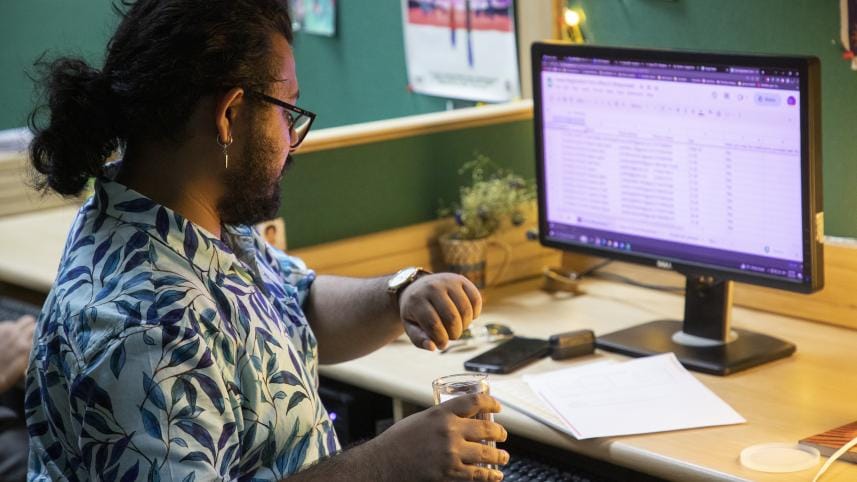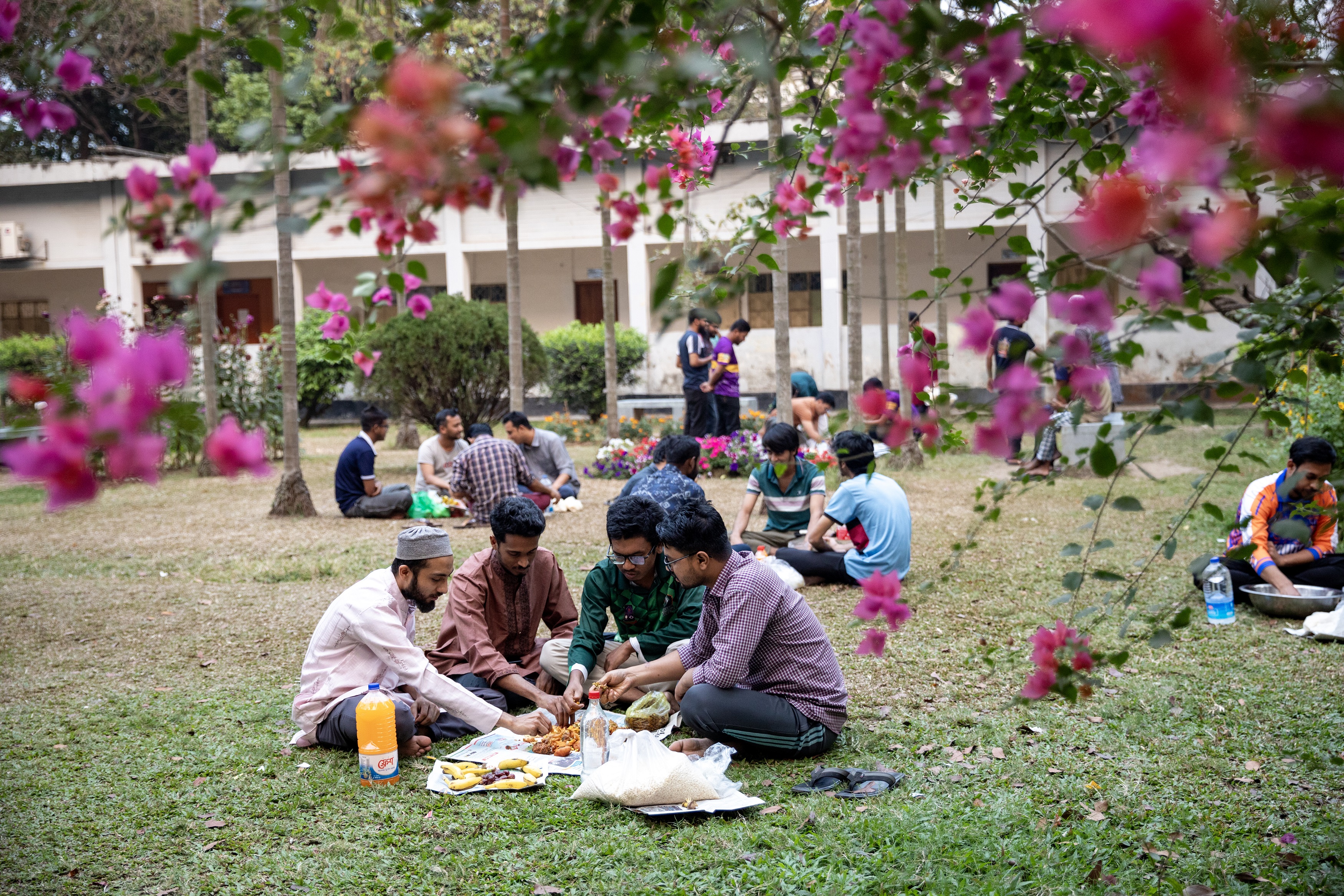Ramadan for young professionals away from home

Whenever I conjure a picture of Ramadan in my mind, I see a table full of food with my family gathered around it. I think of someone waking me up for sehri, the aroma of food filling the house as evening approaches, and of a time when the entire family gets to share a meal together. However, the picture isn't as colourful for everyone. For young professionals living away from home, Ramadan presents a bleak reality. While iftar tends to be a celebration for most, for them, it is just another meal.
Often, even procuring a filling meal for iftar becomes a struggle. Abdullah Al Faiaz, a territory sales executive at a reputed multinational company who is currently posted at Madaripur, said, "I'm having a tough time managing healthy meals for iftar."
"After coming home from work, I am usually too exhausted to prepare anything. Here in Madaripur, it's very difficult to hire household help. Just the other day, after waking up 10 minutes before iftar, I simply warmed up a cup of noodles and that was essentially all I had," he added.
The biggest challenge of living away from home is perhaps the change in the menu for sehri and iftar. Back at home, those who live with their families are accustomed to home-cooked meals for iftar. However, for someone living alone outside Dhaka, home-cooked food is a luxury.
"Whenever I'm in Feni, there's no specific menu for sehri anymore," said Tanvir Rafi, a cluster manager at Grameenphone, who's currently posted in Feni.
"Sometimes, it's just dates and water. Other times, I drink some water and go to sleep early without waking up for sehri. For iftar, I mostly have fruits and occasionally order takeout. The inconsistency and lack of discipline have taken a toll on my health. I don't get any sleep before sehri and feel lethargic all day. This one time, I slept after Asr prayer and woke up at 10 PM, missing iftar altogether."
"The menu lacks variety compared to home, and my sehri routine is completely off track," explained Farhan Shahriar, a maintenance lead at a reputed multinational company, currently posted in Kushtia. "Often, I end up having a late dinner and calling it sehri. On some occasions, I've even woken up after sehri or just before the Fajr adhan."
"Nothing is fixed for sehri anymore," said Shabab Junayed, a territory officer at British American Tobacco, currently posted in Cumilla. "Back home, I'd have someone to wake me up, but now it's just me. Often, I'm too tired, yet I have to stay up for sehri because I can't wake up once I fall asleep. For iftar, it's usually junk food from outside, which has caused me to gain a lot of weight."
Everyone has their own version of Ramadan, built on core memories. Fahim Jawad, a territory manager at Unilever Bangladesh, currently posted in Cumilla, reflects on what he misses most, "Since childhood, my Ramadan consists of praying Taraweeh with my father and brother, arranging plates on the table and making sherbet before iftar. Every Ramadan, we'd also distribute iftar to our building's security guards and others around us. As a family, we looked forward to these traditions, but since I moved out of Dhaka last year, I can no longer partake in them."
"It's very lonely and depressing," said Rafi. "I only now realise how coddled we actually were growing up. My mother is no longer there to wake me up for sehri. And even when I do wake up, I am all alone in this place that I have to call home. I eat by myself, and the food doesn't provide the same comfort. There's also no one to talk to when I'm feeling down," he lamented.
"You start to realise that happiness is in the smallest of blessings when you no longer get to experience them. I miss my mother asking me whether the sugar is okay in the lemonade or if the salt is right in the dish she cooked specifically for my brother and I.
I miss walking in the cool breeze after iftar or playing Valorant with my friends until sehri, and then pretending to sleep just before my mother would come to wake me up. I miss the familiarity and peace of Ramadan at home," Tanvir explained.
For Farhan, the biggest challenge isn't just food but also the spiritual aspect. He said, "Back home, I used to dedicate more time to prayers and reflection during Ramadan. Here, it's not just about balancing work; I feel like I'm not making enough of an effort to strengthen my connection with my faith."
"My sehri routine has been impacted the most," said Fahim, "Usually, I would wake up before Fajr, complete sehri, and perform the Fajr prayer before going back to sleep. But now that I live alone, having a proper meal for sehri isn't feasible. It's usually just water, dates, chocolates, and a cup of milk at best. For iftar, I usually return home from the office a few minutes before iftar, rush to the nearest store to buy whatever I can find and break my fast on the street."
Staying away from family during Ramadan has also given Abdullah a new perspective on the month, "I take nothing for granted anymore. When I return to Dhaka on alternate weekends, I get to share iftar with my family. I keep my phone in my room during iftar whenever I'm back home in Dhaka so that I can truly be in the moment and cherish every bit of it. Ramadan now means being with my family more than anything else."
"Staying alone has given me a lot of time to reflect on myself spiritually," Rafi explained. "Being away from all the distractions has helped me explore the spiritual side of Ramadan more."
Despite the challenges, perhaps the most difficult part of Ramadan for a young professional is learning how to cope and move forward.
"Challenges like these are part of the job itself," Fahim said, "We're working hundreds of kilometres away from home so that we can earn a living and provide for our families. If we keep seeing these as challenges, it'll be really hard to climb out of them. Owning them, managing them, and focusing on work so that we don't get too homesick – it's all part of the job and of life itself."
In the end, Ramadan away from home is a test of resilience for young professionals. While the absence of family, home-cooked meals, and shared traditions makes the month lonelier, it also promotes introspection and self-growth. Despite the adversity, they find ways to survive –cherishing small moments, seeking spiritual fulfilment, and soldiering on with their responsibilities. Although far from home, the spirit of Ramadan remains, reminding them of the warmth back home.
Reach Ifti's spam at hasiburrashidifti@gmail.com



 For all latest news, follow The Daily Star's Google News channel.
For all latest news, follow The Daily Star's Google News channel. 
Comments